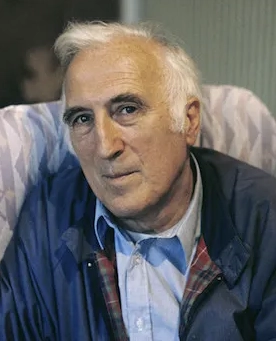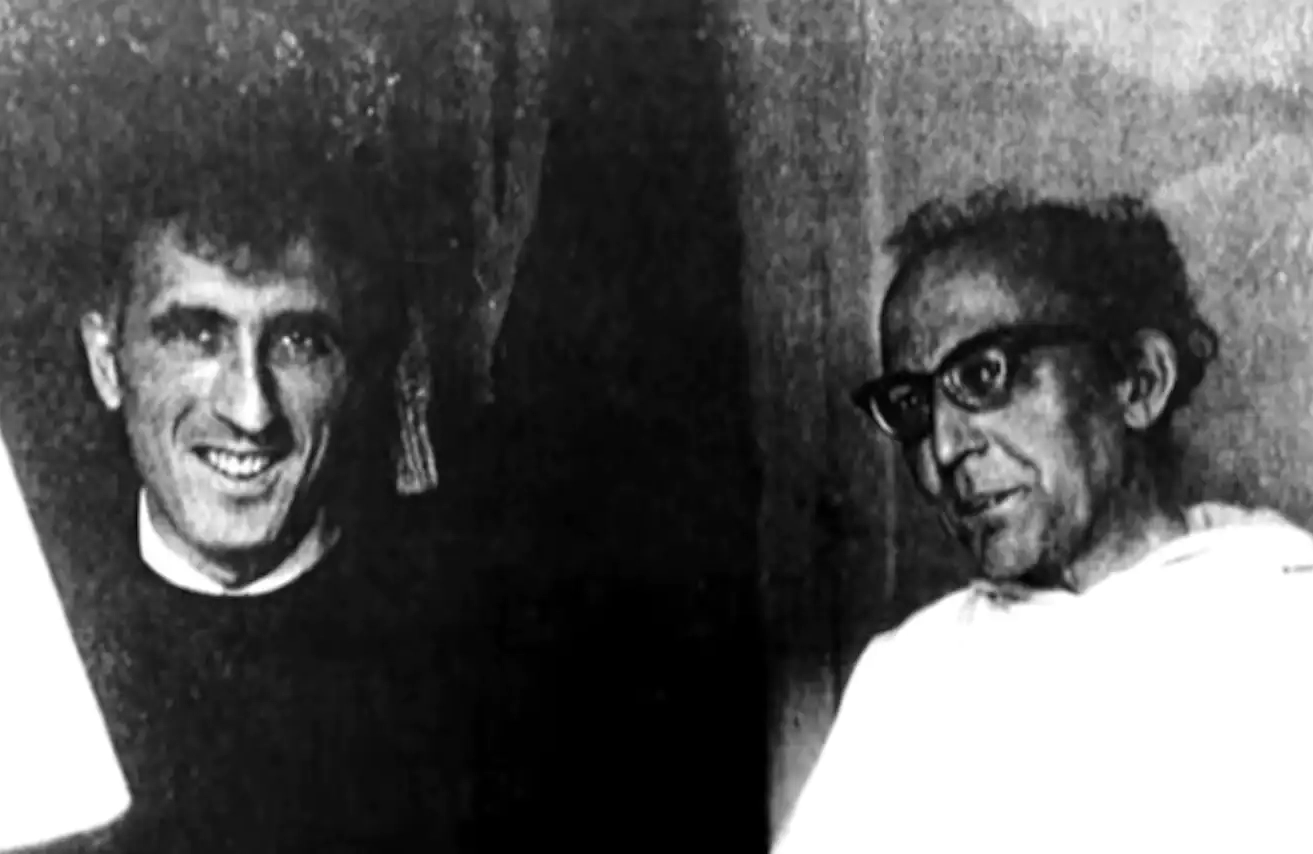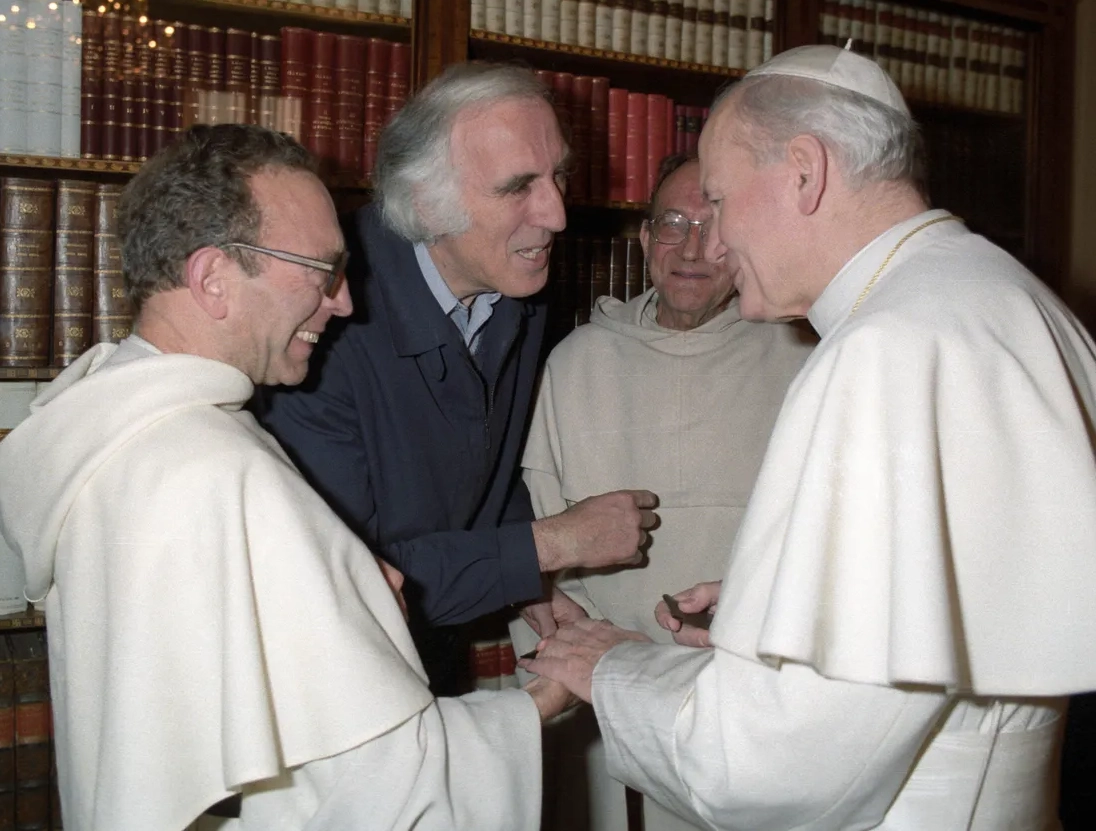PARIS (FRANCE)
Baptist News Global [Jacksonville FL]
February 17, 2023
By Jeff Hampton
Jean Vanier, the renowned and beloved author, speaker and founder of L’Arche, an international network of residential communities supporting adults with intellectual disabilities, also was a sexual predator of women, according to a report released Jan. 30.
The report was commissioned by L’Arche International in 2020 after several women came forward with accusations of abuse by Vanier and Thomas Philippe, a Catholic priest who was Vanier’s spiritual mentor and the source of the twisted “mystico-sexual” beliefs and practices both men purveyed. His influence on Vanier and his disciples was, in fact, the impetus for the entire L’Arche project.
Titled “Control and Abuse Investigation on Thomas Philippe, Jean Vanier and L’Arche (1950-2019),” the report makes clear that the significant work of L’Arche was not impacted by the abuse that is detailed. The abuse was contained among a small group of people at L’Arche’s founding community in Trosly-Breuil, France, and did not involve any of the members or residents that the organization served there or elsewhere. In fact, it was because of that same containment that the larger world of L’Arche was unaware of what was happening for so long.
“Vanier’s founding story about the creation of L’Arche was false.”
Also, that containment in France explains another key finding in the report: That Vanier’s founding story about the creation of L’Arche was false. Vanier often said he started L’Arche in response to hearing a “cry” from God and seeing the inhumane conditions prevalent in mental institutions. In reality, the creation of L’Arche provided a means for Vanier to reconstitute a sect Philippe had led earlier but that had been broken up by the Catholic Church.
The investigation that generated the report was conducted over two years by six French scholars commissioned by the leadership of L’Arche International, based in Paris. They included experts in history, sociology, psychiatry, psychoanalysis, religion and theology. L’Arche financed their research but allowed them to work independently. Their work included more than 100 interviews and digging through untold pages of documents including letters to and from some of the key players. The report was written in French and translated into English.
Jean Vanier
The commission was charged with the task after L’Arche International learned in 2014 of allegations of sexual abuse committed by Philippe, who died in 1993. An investigation by the Catholic church determined Philippe was “the perpetrator of abusive sexual behavior towards adult women.” At the time of the allegations, Vanier said he was “overwhelmed and shocked, absolutely unable to understand how this could have happened.” He publicly denied knowledge of the extent of Philippe’s actions and hid his own actions until his death in 2019.
The 873-page report, which is accompanied by a 127-page synthesis document, follows a previous report, released by L’Arche International in 2020, that confirmed Vanier had been credibly accused of sexual abuse by six women and lied about his knowledge of abuse by Philippe.
Origins of abuse
The report describes how Vanier was born in Geneva and his life was “influenced by a family environment in which religion is central and the events of life, including everyday life, interpreted under the angle of Providence.” His parents and especially his mother came under the influence and counsel of Thomas Philippe, a Dominican priest, who in 1945 founded L’Eau Vive, in Soisy-sur-Seine outside Paris. L’Eau Vive, which means “running water,” is described in the report as “as an international training center. Halfway between the religious community, the Christian youth hostel and the American-style university campus, the center proposes an initiation to theology and philosophy as well as an introduction to contemplative life, resting on Carmelite mystique and a strong Marian devotion.”
In that setting, Philippe began to demonstrate a system of unorthodox beliefs and practices springing from an incident in 1938 where he claimed to have experienced a mystic union with Mary, the mother of Jesus, in front of a fresco called Mater Admirabilis, located in a chapel of the Trinita-dei-Monti convent in Rome.
“He argued that caresses had the function of transubstantiating her female body into that of Mary, thus assimilating these sexual exchanges to a sacrament.”
According to the report, Philippe said in writings, “I was caught in my whole body, all night, in recollection and very intimate union with Her. It was like knowing Mary anew.” He felt the need to impart those “graces” onto others and share the “secret” Mary had told him: that Jesus and Mary had mystical-sexual relations with the aim of rehabilitating the flesh and inaugurating the mystical relations that will be experienced in the kingdom. These relations occurred after Christ’s resurrection and probably after his Ascension and Mary’s Assumption.

According to the testimony of a nun in the report who was abused by Philippe in the early 1950s, “He argued that caresses had the function of transubstantiating her female body into that of Mary, thus assimilating these sexual exchanges to a sacrament. The same nun also recalled that he sought to justify this incestuous model by affirming that ‘there is no line of demarcation between maternal love and conjugal love, that there is love in general, which demands total freedom.’”
Vanier arrived at L’Eau Vive in 1952 after eight years in the Royal and Canadian navies and was immediately captivated by Philippe, who treated him as a spiritual protégé and eventually his spiritual son. Vanier was introduced to Phillipe’s theology, and he was initiated into the practices by Jacqueline d’Halluin, one of Philippe’s disciples. At the same time, two female residents of L’Eau Vive reported Philippe’s activities to Dominican authorities in France. A church trial was launched, which stirred up support among Philippe’s followers and established Vanier as the new leader of the movement in his absence.
“Vanier and his master quickly become experts in the art of secrecy and dissimulation.”
At the end of Philippe’s trial in 1956, the church closed L’Eau Vive and isolated Philippe from Vanier and the women in an attempt to stem the abuses. But as the report details, “Vanier and his master quickly become experts in the art of secrecy and dissimulation. With Jean Vanier’s help, Thomas Philippe carries on his mystico-sexual relationships with the women remaining faithful to him. He calls those the ‘tout-petits’ (the little ones).”
Another narrative track in the report, which is central to the founding of L’Arche, is Vanier’s 25-year desire to become a priest, which ultimately was denied by the church based on fears of his affiliation with Phillipe and uncertainty that he might be carrying on his mentor’s practices.
Pope John Paul II in 1984 with Marie-Dominique, Thomas Philippe and Jean Vanier
As stated in the report: “The hypothesis may be put forward that this thwarted desire to become a priest has shaped Jean Vanier’s complex and ambiguous relation with the church and also contributed to shaping his very ‘free’ style as preacher and spiritual witness. In a letter of 1991 to a lady friend in which he comes back on the refusal of his application for ordination, he gives up ‘wasting time to reform the church’ and announces his wish ‘to be the church where he is.’”
For Vanier, that church was L’Arche — “The Ark.”
The Founding of L’Arche
The first L’Arche home was established in August 1964 in Trosly-Breuil northeast of Paris. The project was supported by the Society for the Education and Protection of Deaf and Dumb Children, also known as SIPSA. It helped that Vanier became a member and deputy treasurer of SIPSA at the beginning of 1964 and then its president in 1967 until its dissolution in 1986. The association with SIPSA provided the ability to receive donations and bequests as well as to charge day rates for overnight guests as a source of income.
The home was led by Vanier along with a small group from L’Eau Vive and some volunteers from outside that circle. Among the former were some of the “tout-petits,” whose presence was wrapped in secrecy because they came primarily to be with Philippe. The growth of the community and the perceived authority of Phillipe as a spiritual leader led to the provision of a permanent place for him to dwell, lead liturgy and receive those who needed spiritual “accompaniment,” as he called it.
While Philippe’s name and role never were listed in official documents, he presented himself as “the representative of the Catholic Church at L’Arche.”
As L’Arche expanded internationally in large part through the writing and speaking of Vanier, Trosly-Breuil became the place where new partners, benefactors and other interested parties were introduced to the L’Arche concept of community. It also was a training center and a place of retreat for members of L’Arche from all over the world.
While not mentioned in the report, among those who visited Vanier at Trosly-Breuil was Henri Nouwen, the internationally regarded Catholic priest and author. The men met at Harvard where Nouwen was teaching and struck up a friendship. Nouwen visited L’Arche twice and in 1985 had a nine-month residency there. Nouwen famously spent the last 10 years of his life at the L’Arche Daybreak Community in Ontario, Canada. When Nouwen died in 1996, Vanier gave the eulogy at his funeral mass.
However, while Trosly-Breuil became a place of energy for the growth of the movement, behind the scenes it still was the place of abuse by Vanier and Philippe, who both lived there until their deaths. According to the report, “It was within the community of Trosly that the majority of the cases of control and sexual abuse investigated by the commission took place. People accused of sexual abuse have been members and have held positions of responsibility there. Victims still live nearby.”
Control and abuse
The commission learned of 25 women who at some point in their relationship with Vanier experienced a sexual act or an intimate gesture. Among them, 14 were or still are members of L’Arche, while others maintained personal contacts with members. Eight were interviewed for the report. Of those, the commission interviewed eight and five declined. The commission assumes 25 is lower than the actual number of women concerned. These relationships span a period from 1952 to 2019. Some were simultaneous, and most lasted several years or even decades.
While the commission was not focused on the extent of Phillipe’s abuse since he was not directly connected to L’Arche, they identified 23 people — both men and women — whom he sexually abused. Among them, six women agreed to be interviewed.
In all the documented cases examined by the commission, Vanier’s victims were adult women, without disabilities, Christians, mostly Catholics, with high cultural resources. Half of them came from privileged social backgrounds. At the time when the first mystico-sexual acts were committed, almost all these women were young adults (20 to 35 years old), single, married or having taken religious vows. In the case of Philippe, the report describes his victims as “mostly pious girls, having received an education marked by Catholic discipline and a taboo on sexuality.”
“Vanier and Phillipe were fully committed to a spiritual deviance that they fully believed in themselves.”
The report states that Vanier and Phillipe controlled their victims with the classic forms of persuasion and control found in cases of abuse: a power relationship with a dependence connecting the victim and the aggressor; exploitation of that dependence by the aggressor; and an absence of valid consent due to the asymmetry of the relationship. Overarching all that was the fact that the abuse was undertaken in the name of spiritual counseling, which they called “accompaniment,” and that Vanier and Phillipe were fully committed to a spiritual deviance that they fully believed in themselves.
As such, the women they abused were compelled to trust and believe what they were being taught. As one of the women said in her interview with the commission: “The Father (Philippe) never used violence with me. I always acted with complete freedom, at least outwardly, because internally I was bound by the fear of displeasing the Blessed Virgin by refusing, as he always repeated to me, and also by a vow of obedience.”

A young Jean Lanier
With regard to Vanier, “accompaniments” he initiated with women “most often blended spiritual, psychological, professional and vocational dimensions: the confusion of genres created a fertile ground for influence in relationships. Control in relationships was all the more easily established as there was no real counterweight to hinder the process.”
As well, Vanier didn’t limit his approaches to unattached or inexperienced women. As stated in the report: “Because he considered these experiences as ‘chaste sexuality,’ Jean Vanier invited single women, and others living with a boyfriend, married or having taken the religious vows of chastity, women who already had an active sexuality or women who had never had any sexual experience with a partner.”
“To one he said, ‘But Jesus and I are not two, we are one,” and, “It is Jesus who loves you through me.’”
When a partner raised doubts about what Vanier was leading them into, he was said to minimize the sexual nature of the acts committed in favor of the primacy of spiritual communion and especially the union of Jesus and Mary. “It’s not us, it’s Mary and Jesus,” he would say. And to one he said, “But Jesus and I are not two, we are one,” and, “It is Jesus who loves you through me.”
One of the women interviewed said this about the confusion and control Vanier placed on her: “He is like a ‘midwife’ for me since he leads me into life. … JV’s physical gift is unbearable to me. He is confusing and dangerous. Yet I don’t stop him because his motives are good. The last thing he wants is to hurt me. ‘I can’t imagine what I would do without you,’ I told him. But his desire is to free me, to give me life, and for that the umbilical cord must be cut. Wait: he told me he was the midwife.”
The power of personality
The report includes significant personality and psychological profiling of both men and concludes that both were driven by serious and complex behaviors and delusions rather than simply just bad behavior.
Vanier is described as a man who suffered from “functional limitation” brought on by the lack of friends and loving relationships growing up, which resulted in intense internal insecurity linked to the anxiety of being abandoned. He found his real life directly in his relationship with God, in the “spiritual” realm. Said the report: “This helps us to understand his immense solitude, but also what people who knew him frequently referred to as his need to control, sometimes even described as ‘manipulation.’”
While Vanier never became a priest, his personality, spiritual competence and seemingly endless compassion and empathy not only created a fertile ground for abuse but also for the growth and development of L’Arche. As described in the report, Vanier was “a ‘master’ who ‘impressed’ and who was ‘looked upon with great respect,’ he was sometimes referred to as a ‘father’ or as a ‘brother whom we love,’ or more rarely, as a ‘friend.’ The stories attest to the dynamics of the relationships with Jean Vanier, acknowledging his capital role in the personal, professional and spiritual trajectories of the leaders at L’Arche.”
“His personality, spiritual competence and seemingly endless compassion and empathy not only created a fertile ground for abuse but also for the growth and development of L’Arche.”
The report goes on to identify three “registers” that placed him above suspicion and reproach and contributed to the admiration and attachment he drew: a prophetic character, a confident and confirming guide, and a clear-sighted founder-leader. In his own talks, he described these characteristics in terms of the educator, the father and the shepherd.
Vanier’s aura and reputation as a great spiritual leader protected him and confounded the leaders of L’Arche when the first reports of abuse by Phillipe were being explored.
“The desire to obtain answers from him went through a form of negotiation where progress was made respectfully,” according to the report. “While giving certain guarantees of openness, Jean Vanier said as little as possible and managed to drag things out. It was a difficulty for those in charge at L’Arche, despite their strong desire to reach the truth, to free themselves from the strong ties that linked everyone to Jean Vanier. It was also difficult for the institution to ignore the priority of its unity and its perpetuation.”
Aftermath
What will be the aftermath of the investigation and report?
In an open letter addressed to friends and partners of L’Arche and posted on the organization’s website, Tina Bovermann, national leader and executive director of L’Arche USA and a member of L’Arche’s international leadership team, condemned the abuse, voiced regret that the organization did not know what was happening, apologized for the suffering that was caused, and commended the bravery of the women who had come forward with their stories of abuse.
She also announced that L’Arche International has joined the Commission Reconnaissance et Réparation, an independent commission set up by the French Catholic Church to receive and treat reparation requests for abuse committed by clerics or lay people. “Victims of Thomas Philippe and of Jean Vanier, whether they live in France or abroad, have the possibility to engage, if they so wish, in a process of restorative justice,” she said.
And, finally, she reiterated L’Arche’s mission that has grown and endured in spite of the abuses of its founder.
“We witness the power of L’Arche’s mission every day: friendships across differences; voices made heard; quality services provided, respect and laughter, celebrations, and joy, authenticity. Truth can be painful. Truth is always powerful. Truth is always right. We believe in its justice and are grateful for the opportunities that it invites.”
Jeff Hampton is a freelance writer who lives in Dallas.
